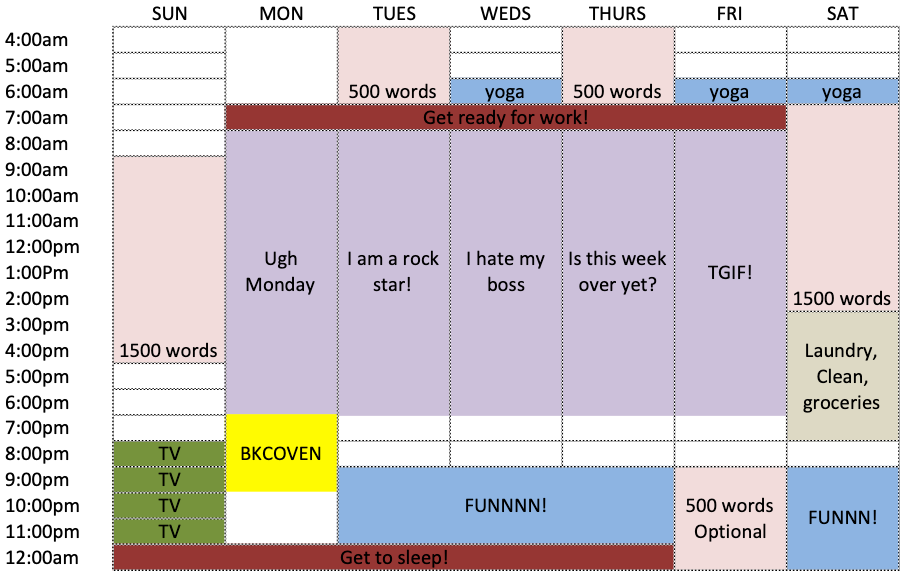Finding The Write Time
Improve your mental health and maximize your writing potential with a personalized routine

You want to write but you’re blocked. Tired. Battling a negative thought loop that won’t quit. Depressed? Yeah, me too. Maybe you’re a student with a rigorous course schedule. Maybe you have a full-time job. Maybe you have a family and a full-time job. Maybe you have a family, a full-time job, and a slew of other commitments that make your life full and exhausting.
Your creativity lives in the tiny bit of free time you find in the early morning or the late hours of the night. Maybe you just look at your laptop and cringe. There are days you question if you’ll ever write a word, finish a project, if you’re delusional, if you should give up.
Don’t give up. What you need is a schedule. Not a calendar with some scribbles on it. I mean an army style regimen where everything from bathing to sex is anticipated and executed in a suitable manner to ease the pressure of decision making and give you more time to write. It sounds harsh, but you won’t think so when that finished project is in your hands ready to be optioned for a movie. Sex with the lead actor? Let’s schedule it in.
Before you run for the hills, hear me out. Hemingway had bipolar disorder and wrote every morning as soon after first light as possible. Virginia Woolf suffered episodes of “madness” but when well she wrote every morning with the “regularity of a stockbroker.” Evidence suggests that creating a reliable daily routine helps improve mental health. It did for me. Without a routine, my thoughts can get a little wild and my day becomes unproductive real quick. You can carve out all the time you want, but if you’re not managing that time, you’re not maximizing your writing.
Let’s break it down. I wrote three books in one year while holding down a 9-6 job, cultivating a social life, nurturing a wine obsession, working out, and attending weekly sessions with my therapist. That’s at minimum of 150,000 words (turns out I wrote 175,000). It sounded unrealistic, but when I thought about it as 3,000 – 4,000 words per week, I got creative. My schedule was sporadic, but I designed it that way so I wouldn’t burn out. I’d get up early and write one or two mornings a week, every other Friday night, the weekend was the bulk, but I never stopped doing the other things that were important to me, I just rearranged them.
My weeks looked something like this for the entire year. I added in the optional time so I could ramp up word count before I went on vacations, Holidays, etc.
What you don’t see in the schedule is that I slept in sometimes, that the words didn’t always flow, that I got sick. To make up time I wrote on an app during the train ride to work, I took time at lunch to write, I dictated paragraphs into my phone’s voice memo. I wrote everywhere.
MEDITATION TO GROUND OUR PERSONAL VALUES AND CREATIVE VISION
You see where I’m going with this, but before you start stressing out, find a quiet space where your thoughts will be grounded and let’s meditate on your goals for your creativity.
Ask your higher self to integrate your life fully so that your commitments can be totally in harmony with your artistic ambitions. See your life as you navigate your needs, the needs of others and the needs of your inspired project.
Can you see yourself making time for your writing?
EXERCISE:
1.Grab a pen and paper or your laptop and sketch out the days of the week across the top and hour increments of time down the side. Like the one above.
2. Fill in your week hour by hour as it currently is.
3. Identify blocks of time that have potential for writing-even if it’s just an hour
4 Identify a few hours that you could block out every other week for a writing group / class/ or a write-in event.
5: Follow your new schedule for a week and revise it if needed.
6: Research Writing Apps for writing on the go (I recommend Scrivener or Ulysses)
A little more Inspiration:
https://www.bustle.com/articles/194001-the-daily-writing-habits-of-10-famous-authors




